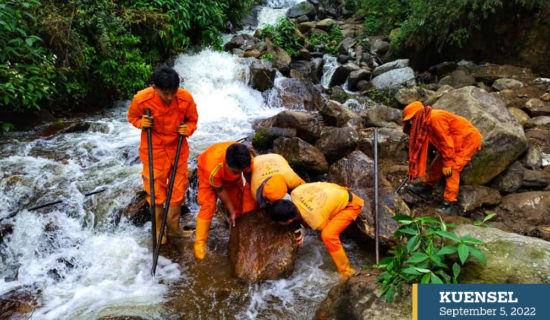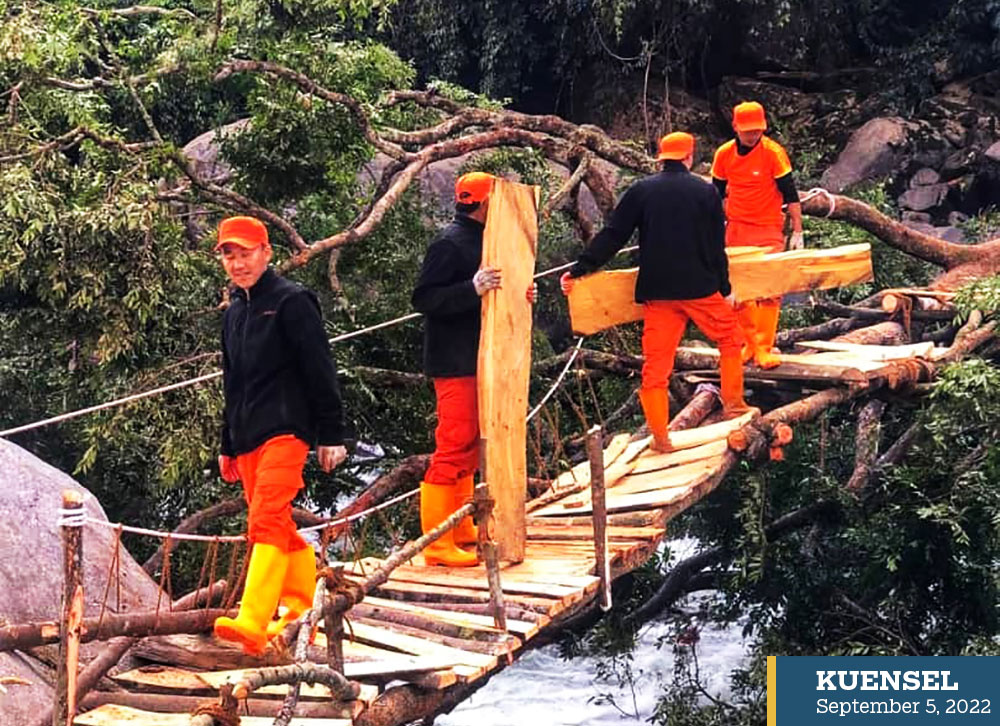Neten Dorji | Doksum
Every year, farmers of Ramjar have to quarrel and even fight for water during the paddy cultivation season. They irrigate their fields in turns. Sometimes paddy fields dry up as the farmers wait for their turn to come.
Those difficult days are history now. The De-Suung national service irrigation water project handed over to the community an improved irrigation scheme yesterday.
Around 50 de-suups laid pipes and constructed three reservoirs in the past seven months working on the project that cost Nu 13.7 million.
The irrigation water project which was started on January 12 will reach 107 acres of dry land and 66 acres of wetland benefitting more than 333 households in Ramjar.
Farmers of Ramjar are happy and many are planning to cultivate more paddy and winter vegetables.

De-suups during the construction of the irrigation scheme
Sangay Dema is one of the farmers with the biggest land holdings in the village. She said, “As of now, we mostly depend on rainwater to supplement the existing small stream and cultivation of paddy was difficult.”
She said the small irrigation water from Zamna which was serving the purpose in the olden days for a few households in farming was insufficient as it was also used for drinking.
The canal draws water from Lungdidrang under Tongmajangsa gewog about seven kilometres from Wangringmo.
With only one source for people who own land at Wangringmo, the water shortage was felt especially during paddy cultivation. “The same source was shared with more than 300 households,” said a villager, Pema Choden.
She said residents faced an acute shortage of irrigation water problems and that created disharmony in the community.
The villagers said they guard their fields at night and had to use water in turn. “But this was unfair for those who are at the end of the line because, by the time their turn comes, some seedlings die and hamper the yield,” said a villager.
Most of the time, farmers depend on small irrigation water, but with time it has become insufficient. Some have given up and left their land fallow.
“We tried to pump water from Drangmechu but it failed. All farmers were hopeless since, after so much hard work, the production dwindled,” said another villager, Dechen Wangmo.
She said with help of the De-Suung national service water project, their problems are over now.
Villagers said although 80 percent of the fields at Wangringmo is wetland, around half of it was left fallow due to water shortage.
A villager, Tenzin Dorji said, “We were in dire need of water and we are grateful to His Majesty The King for this project.”
Villagers have formed a group and appointed two caretakers to look after the water canal. “The government had invested a huge budget for irrigation. We have to take ownership of the irrigation canal and take care of it,” a villager said.
An official from Trashiyangtse agriculture sector, Chhimi Drakpa said, “With the completion of the irrigation water project, it will help restore the uncultivated land. It will also help farmers increase chilli and paddy production.”
National Council Chairperson, Tashi Dorji, and Members of Parliament from Trashiyangtse were present during the handing-taking ceremony.
The Wangringmo water project is the second De-Suung national service water project in Trashiyangtse.


